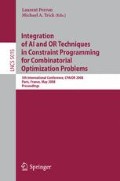Abstract
Software optimization for multicore architectures is one of the most critical challenges in today’s high-end computing. In this paper we focus on a well-known multicore platform, namely the Cell BE processor, and we address the problem of allocating and scheduling its processors, communication channels and memories, with the goal of minimizing application execution time.
We have developed a complete optimization strategy based on Benders’ decomposition. Unfortunately, a traditional two-stage decomposition produces unbalanced components: the allocation part is difficult, while the scheduling part is much easier. To address this issue, we have developed a multi-stage decomposition, which is a recursive application of standard Logic based Benders’ Decomposition (LBD). Our experiments demonstrate that this approach is very effective in obtaining balanced sub-problems and in reducing the runtime of the optimizer.
Access this chapter
Tax calculation will be finalised at checkout
Purchases are for personal use only
Preview
Unable to display preview. Download preview PDF.
References
Benini, L., Bertozzi, D., Guerri, A., Milano, M.: Allocation and scheduling for MPSOCs via decomposition and no-good generation. In: van Beek, P. (ed.) CP 2005. LNCS, vol. 3709, Springer, Heidelberg (2005)
Benini, L., Bertozzi, D., Guerri, A., Milano, M.: Allocation, Scheduling and Voltage Scaling on Energy Aware MPSoCs. In: Beck, J.C., Smith, B.M. (eds.) CPAIOR 2006. LNCS, vol. 3990, Springer, Heidelberg (2006)
Benini, L., Lombardi, M., Mantovani, M., Milano, M., Ruggiero, M.: Multi-stage Benders Decomposition for Optimizing Multicore Architectures. Technical Report LIA-008-07
Bockmayr, A., Pisaruk, N.: Detecting infeasibility and generating cuts for MIP using CP. In: Int. Workshop Integration AI OR Techniques Constraint Programming Combin. Optim. Problems CP-AI-OR 2003, Montreal, Canada (2003)
Flachs, B., et al.: A streaming processing unit for a cell processor. In: Solid-State Circuits Conference. Digest of Technical Papers. ISSCC. 2005 IEEE International, pp. 134–135 (2005)
Grossmann, I.E., Jain, V.: Algorithms for hybrid milp/cp models for a class of optimization problems. INFORMS Journal on Computing 13, 258–276 (2001)
Hooker, J.N., Ottosson, G.: Logic-based benders decomposition. Mathematical Programming 96, 33–60 (2003)
Hooker, J.N.: A hybrid method for planning and scheduling. In: Wallace, M. (ed.) CP 2004. LNCS, vol. 3258, pp. 305–316. Springer, Heidelberg (2004)
Hooker, J.N.: Planning and scheduling to minimize tardiness. In: van Beek, P. (ed.) CP 2005. LNCS, vol. 3709, pp. 314–327. Springer, Heidelberg (2005)
Kistler, M., Perrone, M., Petrini, F.: Cell multiprocessor communication network: Built for speed. IEEE Micro 26(3), 10–23 (2006)
Pham, D., et al.: The design and implementation of a first-generation cell processor. In: IEEE International Solid-State Circuits Conference ISSCC 2005, vol. 1, pp. 184–592 (2005)
Sadykov, R., Wolsey, L.A.: Integer Programming and Constraint Programming in Solving a Multimachine Assignment Scheduling Problem with Deadlines and Release Dates. INFORMS Journal on Computing 18(2), 209–217 (2006)
de Siqueira, N.J.L., Puget, J.F.: Explanation-Based Generalisation of Failures. In: European Conference on Artificial Intelligence, pp. 339–344 (1988)
Junker, U.: QUICKXPLAIN: Preferred Explanations and Relaxations for Over-Constrained Problems. In: Proc. of the Nineteenth National Conference on Artificial Intelligence - AAAI 2004, San Jose, California, USA, July 2004, pp. 167–172. AAAI Press / The MIT Press (2004)
Lombardi, M., Milano, M.: Stochastic Allocation and Scheduling for Conditional Task Graphs in MPSoCs. In: Proc. of the Intl. Conference in Principles and Practice of Constraint Programming (2006)
Tarim, A., Miguel, I.: A Hybrid Benders Decomposition Method for Solving Stochastic Constraint Programs with Linear Recourse. In: Hnich, B., Carlsson, M., Fages, F., Rossi, F. (eds.) CSCLP 2005. LNCS (LNAI), vol. 3978, pp. 133–148. Springer, Heidelberg (2006)
Cambazard, H., Jussien, N.: Integrating Benders Decomposition Within Constraint Programming. In: Proc. of the Intl. Conference in Principles and Practice of Constraint Programming, pp. 752–756. Springer, Heidelberg (2005)
Author information
Authors and Affiliations
Editor information
Rights and permissions
Copyright information
© 2008 Springer-Verlag Berlin Heidelberg
About this paper
Cite this paper
Benini, L., Lombardi, M., Mantovani, M., Milano, M., Ruggiero, M. (2008). Multi-stage Benders Decomposition for Optimizing Multicore Architectures. In: Perron, L., Trick, M.A. (eds) Integration of AI and OR Techniques in Constraint Programming for Combinatorial Optimization Problems. CPAIOR 2008. Lecture Notes in Computer Science, vol 5015. Springer, Berlin, Heidelberg. https://doi.org/10.1007/978-3-540-68155-7_6
Download citation
DOI: https://doi.org/10.1007/978-3-540-68155-7_6
Publisher Name: Springer, Berlin, Heidelberg
Print ISBN: 978-3-540-68154-0
Online ISBN: 978-3-540-68155-7
eBook Packages: Computer ScienceComputer Science (R0)

